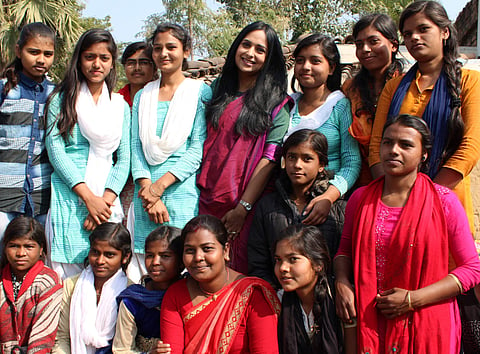

How did the young women in a remote village in Bihar set up a pad bank and raise awareness about menstrual hygiene? This is how. In a bid to stop looking at sexual health issues as a taboo, the Population Foundation of India has been working closely with girls in rural areas in Bihar to sensitise them on issues related to menstrual health.
PFI is a non-profit organisation based in Delhi that has been working with youngsters across North India to sensitise them about population, family planning, using sanitary napkins, addressing health issues at right time etc. As a result, the girls in Hardiya Village of Nawada district in Bihar started a pad bank in 2018.
Though a pad bank is not something unusual, the concept that these girls have adopted is a bit different from others. At this pad bank, girls in the village collect one rupee a day from members and at the end of the month, when the money goes up to Rs 30 or more than that, they buy sanitary napkins and provide it those women who cannot afford them.
But how did this initiative begin in a village where people hesitate to talk openly about buying pads or about the menstrual health of women? Rishu Prakash recalls, "It was in 2014 that we collaborated with local NGOs both in Dharbanga and Nawada districts to work with adolescent girls and sensitise them about their health issues. We also developed some comic books and digitised posters that had information and graphics about menstrual health. These posters were shared on the WhatsApp group to educate them. As the adolescent girls and women in the village started understanding these facts, they demanded services like do special health clinics to discuss their issues with doctors and staff in a friendly manner. Similarly, they demanded free sanitary napkins from the government."
Rishu was happy to see that the government approved establishing Yuva Health Clinics in Hardiya and surrounding villages. He says, "Currently, Hardiya has a Yuva Health Clinic where young girls and women and even men approach doctors seeking solutions for various health issues. Similarly, they are involved in creating awareness about using condoms and contraceptives that can control the population of the village."
While the Yuva Health Clinic was in place, the girls also decided to set up a pad bank. Rishu remembers that initially there was agitation from parents and elders of the village. But when PFI intervened and told them that there is nothing harmful in discussing one's menstrual health or distributing free pads, the parents and elders allowed them to go ahead. From then onwards, the girls not only set up these pad banks in their villages but spread the word among adolescent girls in other villages. At present, there are over 56 pad banks started by adolescent girls in other villages also.
In the coming days, these girls will demand that the state government provide free sanitary napkins to women and girls of all ages. Rishu says, "For now, the state government provides Rs 150 Rs 300 annually to procure sanitary napkins. But what about youngsters and women who are not attending colleges or are involved in the housework? Such women are also supposed to be getting free napkins. While these girls have already placed their demands, the state government has agreed but it is yet to implement the same."
